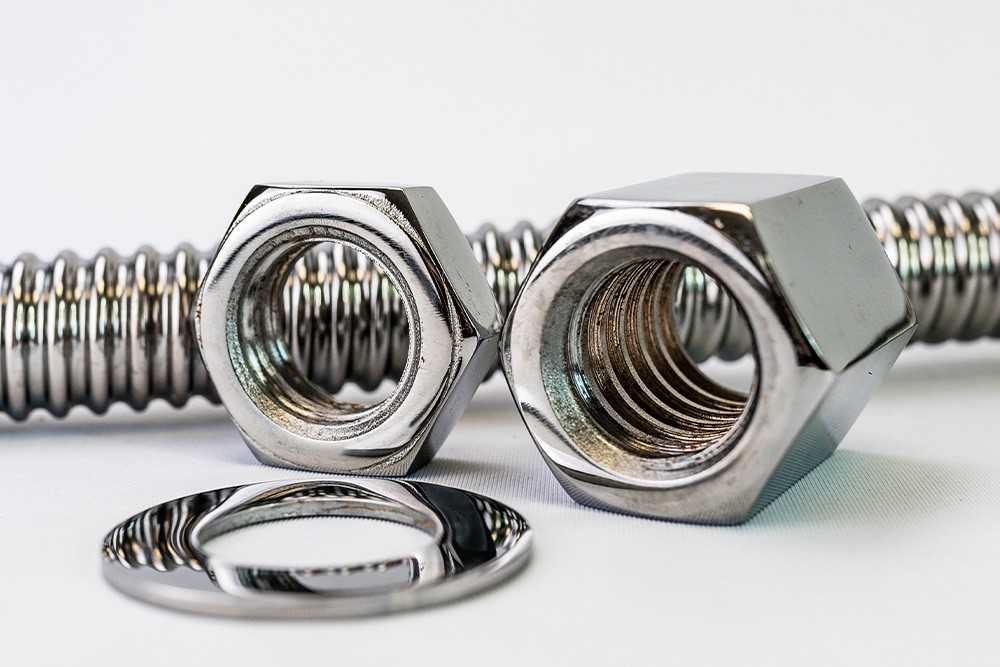Are you responsible for procuring heavy hex nuts and domestic nuts for your company’s industrial project? Selecting the right nuts for the job is critical.
When searching for products, you’ll come across several options. Two such options are hex nuts and jam nuts. What’s the difference? More importantly, which do you need to order for your project?
This article will examine both types of fasteners in this jam nut vs hex nut comparison. We also discuss how you can procure them.
What Are Standard Hex Nuts?
Standard hex nuts are exactly what they sound like: fasteners with a hexagonal shape. These nuts have internal threading. The threading allows the nut to be fastened to a bolt.
All six sides of a hex nut have an equal length. The nuts are twisted onto a bolt’s external threads. This threading makes them reusable fasteners.
Some types of hex nuts can be hand-tightened. However, most hex nuts must be tightened with a wrench. Otherwise, they won’t be snug enough to stay in place.
Hex nuts are graded based on quality and durability, so it’s best to select a nut rated for the intended use. Otherwise, they might fail or create safety issues.
What Are Jam Nuts?
Jam nuts are also hexagonal fasteners. However, they’re not primary fastening devices. Put simply, they’re never used without another type of nut.
Jam nuts must be “jammed” against a standard hex nut. They have six equal sides. A jam nut will also have the same internal threading as the standard nut it’s being paired with. Jam nuts are usually thinner, though.
Jam nuts are made to prevent standard nuts from backing off a bolt. Jam nuts are commonly used when heavy vibration is present. For example, industrial equipment may be held together with bolts, hex nuts, and jam nuts.
Heavy Hex Jam Nuts vs. Hex Jam Nuts
There’s more than one type of jam nut.
A standard jam nut is very thin, and it’s generally used to prevent the main nut from coming loose.
Jam nuts aren’t “structural” fasteners, which means they don’t meet any industry specification for strength.
Heavy hex jam nuts are much like standard jam nuts. They aren’t structural fasteners, so they aren’t assigned a grade.
Heavy hex jam nuts are always used with regular nuts. The difference is that heavy hex jam nuts are thicker. They also have wider flats and bigger corners. This makes them better suited for harsh applications.
Differences Between Hex and Jam Nuts
There are a few key differences between standard hex and jam nuts.
Standard hex nuts are graded because they’re considered “structural” fasteners. They’re tightened directly against the medium that is being fastened, whether it’s a steel beam, board, or another surface.
Jam nuts are fastened against hex nuts. They prevent the main nut from loosening. They’re only used when the nuts are exposed to vibrations. Jam nuts cannot be used as a structural fastener.
Sourcing Jam Nuts
Jam nuts are available in galvanized or standard finishes. They can be sourced using several different methods.
One approach involves overseas sourcing. This method isn’t advisable, as you may encounter several issues. Namely, you might face excessive shipping and delivery times. Furthermore, product quality may vary greatly.
The better option is domestic sourcing. A domestic provider can offer better delivery times. They can also provide superior quality products, including jam and hex nuts.
Why Dyson Corp.?
Now that we have concluded our jam nut vs. hex nut comparison, you will want to order the proper nuts from a reputable supplier that can support your fastener procurement needs. Dyson Corp. is that supplier.
We manufacture all of our domestic nuts right here in the United States. Our 100% American-made goods offer better reliability, quality, and performance than overseas options. Additionally, we offer prompt shipping times to help you meet tight deadlines.
Want to explore Dyson Corp.’s products for your industrial projects? If so, we invite you to browse our product catalog.
Need something custom-made to your specs? We can also help with that, thanks to our custom fastener engineering and forging services. Contact us today to learn more. We are here to help procurement managers select the ideal products for their company’s jobs.
